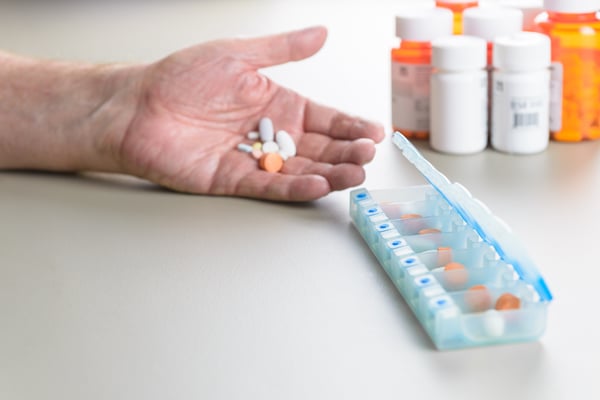3 Patient Education Strategies to Encourage Medication Adherence

Patient education is a critical component of any high-quality healthcare program, and as our healthcare system moves further toward patient centricity, health plans and provider groups who neglect to engage and educate patients in their health will struggle to stay profitable. Let’s dig into what at-risk providers and health plans can do today to drive adherence among their member populations.
What is patient education?
According to the American Academy of Family Physicians, patient education is the process of influencing patient behavior and producing the changes in knowledge, attitudes, and skills necessary to maintain or improve health. The important takeaway from this definition is that patient education has a positive influence on maintaining and improving health. As health plans know well: maintaining and improving health is key to Star Rating performance and maximizing government reimbursements.
Healthcare providers and clinicians of all kinds can play a role in educating patients across various care settings. However, some of the most overlooked patient educators also happen to be some of the most accessible—clinical pharmacists.
Why is patient education important?
Patient education’s importance lies in its ability to improve self-efficacy in patients. Self-efficacy is a patient’s belief in their ability to accomplish certain tasks—in this case, maintaining and improving their health. Patient education improves self-efficacy by equipping patients with the knowledge and tools necessary to take responsibility for their own health.
However, when patients are uneducated about their health, it’s no wonder that they are less able to make positive changes. Sometimes they simply don’t know which action to take. This also applies to medication adherence. Unfortunately, many patients are unaware of why certain medications have been prescribed to them. They simply “take this because my doctor told me to.” This approach to medication administration creates risks for nonadherence due to misunderstanding or undervaluing the benefits of proper adherence to medication regimens.
Taking responsibility for patient education
For decades, pharmacists have traditionally worked in high-stress, high-volume environments that were not conducive to providing thorough patient education. However, in recent years, new platforms such as Aspen RxHealth have begun to allow pharmacists to practice from home, taking a comprehensive approach to whole person care, unhindered by performance quotas and inventory management.
Most clinical pharmacists choose their profession based on a passion for helping patients realize the health benefits and life-changing effects of medications properly utilized. This is exactly why pharmacists are perfectly poised to take a primary role in patient education.
As healthcare’s top medication experts, nobody is better equipped than pharmacists to educate patients about the details of their medications. While new, innovative technologies and knowledge resources can aid in patient education, there’s no substitute for the consultative expertise of a clinical pharmacist to aid patients in understanding the benefits of their medications. With as many as half of Americans reporting difficulty in understanding their medication instructions, the opportunities for pharmacists to improve patient education are numerous.
The role of patient education in medication adherence
Would you take a newly prescribed medication without knowing about it and having your questions answered? We didn’t think so. Herein lies the importance of patient education for medication adherence. A lack of understanding shouldn’t stop patients from receiving the maximum benefit of their medications. That’s why education is critical to increasing their likelihood of remaining adherent.
Patient education’s impact on medication adherence takes us back to an increase in self-efficacy. By partnering, educating, and engaging with patients, clinical pharmacists can improve patients’ self-efficacy, and subsequent likelihood to remain adherent. In fact, a 2017 study found that high levels of self-efficacy consistently promote medication adherence.

3 patient education strategies to improve medication adherence
Through technology platforms such as Aspen RxHealth, it’s easier than ever for pharmacists to connect with patients. Let’s dive into a few of the ways that clinical pharmacists can help patients better understand their medications:
- Educate: Some patients aren’t aware of why certain medications are prescribed to them or have been taking them for so long they forgot why they started. Pharmacists can help these patients see the value in each of their medications and how they work synergistically for maximum health benefit.
- Encourage: As medications for the treatment of chronic conditions become more complex, patients can look to pharmacists for help in understanding how individual medications should be administered for maximum benefit. Some medications must be taken at certain times of day and with or without food. Pharmacists can educate patients about why these factors are important and help them take their medications properly.
- Engage: Nearly all medications come with the risk of potential side effects. While many are harmless, patients should always be aware of the potential side effects of their medications. During a medication consultation, a clinical pharmacist can engage with their patient and inform them of which side effects to look for and help them take action should they experience any themselves. If the pharmacist detects a side effect in a patient’s regimen, they can act swiftly to engage the prescribing provider and recommend an alternative therapy.
These patient education strategies are only the tip of the iceberg for pharmacist-led clinical consultations. Fortunately for patients and the US healthcare system, the true value of pharmacists is becoming more apparent, appreciated, and valued.
Learn more about why pharmacists can be the key to successful clinical programs.